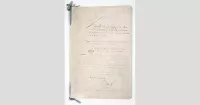The Act of Settlement 1701 was an Act of the Parliament of England that dictated the succession to the English and Irish crowns, limiting it to Protestants only. It specifically excluded anyone who was Catholic or married to a Catholic from inheriting the throne. This effectively bypassed other descendants of Charles I in favor of Sophia of Hanover, a Protestant granddaughter of James VI and I. Upon the death of Queen Anne, Sophia's son, George I, ascended to the throne, initiating the Hanoverian dynasty in Britain.
1900: Commonwealth of Australia Constitution Act Passed
In 1900, the Commonwealth of Australia Constitution Act was passed. Clause 2 extends provisions referring to the Queen to Her Majesty's heirs and successors in the sovereignty of the United Kingdom.
1926: By-election Requirement for Ministers of the Crown Removed
In 1926, the requirement for ministers of the Crown to stand for a by-election to re-enter the House upon such appointment was removed. This change affected the provision that no person with an office under the monarch, or receiving a pension from the Crown, could be a Member of Parliament.
1931: Statute of Westminster Acknowledges Agreement for Succession Changes
In 1931, the Statute of Westminster acknowledged that any changes to the rules of succession may be made only with the agreement of all of the states involved, with concurrent amendments to be made by each state's parliament or parliaments.
1931: Statute of Westminster Enacted
In 1931, the Statute of Westminster was enacted, establishing the convention that changes to the Act of Settlement and other succession laws require the agreement of all Commonwealth realms.
1936: Australian Constitution Lacks Power to Legislate on Monarchy
During the crisis of 1936, it was noted that the Australian constitution contains no power for the federal parliament to legislate with respect to the monarchy.
December 1978: Powell Defends Exclusion of Roman Catholics from Throne
In December 1978, amid media speculation about Prince Charles marrying a Roman Catholic, Powell defended the Act of Settlement's provision excluding Roman Catholics from ascending the throne, citing political considerations and concerns about external authority.
1978: Prince Michael of Kent Removed From Line of Succession
In 1978, Prince Michael of Kent, who was fifteenth in line for the throne, was removed from the line of succession due to his marriage to Baroness Marie-Christine von Reibnitz, who is Roman Catholic.
1981: British Nationality Act Enacted
In 1981, the British Nationality Act was enacted, it made naturalized citizens equal to those native born and excluded Commonwealth citizens from the definition of foreigners, and citizens of the Irish Republic from the definition of aliens, while retaining the original Act's provision against foreigners holding positions of power.
1988: George Windsor, Earl of St Andrews, Marries Roman Catholic
In 1988, George Windsor, Earl of St Andrews, married Sylvana Palma Tomaselli, who is Roman Catholic, making him ineligible to succeed the throne at the time.
1988: Lord St Andrews Loses Place in Line of Succession
In 1988, Lord St Andrews lost his place in the line of succession when he married the Roman Catholic Canadian Sylvana Palma Tomaselli.
November 1995: Prince Charles Expresses Support for Catholics on the Throne
In November 1995, Prince Charles reportedly told Tony Blair and Paddy Ashdown that he believed "Catholics should be able to ascend to the British throne."
1998: Richard Toporoski Theorizes on Alterations to the Act of Settlement
In 1998, Canadian scholar Richard Toporoski theorized that if an alteration were made in the United Kingdom to the Act of Settlement 1701, the domestic constitutional law of Australia or Papua New Guinea would provide for the succession in those countries of the same person who became Sovereign of the United Kingdom.
1998: Queen Has No Objection to Equal Treatment of Daughters and Sons
In 1998, during debate on a Succession to the Crown Bill, Lord Williams of Mostyn informed the House of Lords that the Queen had "no objection to the Government's view that in determining the line of succession to the throne, daughters and sons should be treated in the same way."
1999: Scottish Parliament Calls for Removal of Discrimination
In 1999, the Scottish Parliament unanimously passed a motion calling for the complete removal of any discrimination linked to the monarchy and the repeal of the Act of Settlement.
2002: O'Donohue Launches Court Action Against Act of Settlement
In 2002, Tony O'Donohue launched a court action in Canada, arguing that the Act of Settlement violated the Canadian Charter of Rights and Freedoms. The case was later dismissed.
2003: Defense of the Act of Settlement
In 2003, Adrian Hilton defended the Act of Settlement in The Spectator, arguing it was not irrational prejudice but a necessary protection against religious and civil liberty being lost under a Roman Catholic monarch due to the Pope's claimed universal jurisdiction.
2003: Lord Downpatrick Converts to Roman Catholicism
In 2003, Lord Downpatrick, the son of George Windsor, Earl of St Andrews, converted to Roman Catholicism, making him the most senior descendant of Sophia to be barred from succession due to religion.
December 2004: Succession to the Crown Bill Introduced
In December 2004, a private member's bill, the Succession to the Crown Bill, was introduced in the House of Lords. The Tony Blair government blocked attempts to revise succession laws.
March 2005: Appeal Dismissed in O'Donohue's Case
On March 16, 2005, an appeal of the decision in Tony O'Donohue's court action against the Act of Settlement was dismissed.
2007: Engagement of Peter Phillips Revives Act of Settlement Discussion
In 2007, the announcement of the engagement of Peter Phillips to Autumn Kelly, a Roman Catholic, revived discussion about the Act of Settlement. Concerns were raised regarding Phillips' potential ineligibility to accede to the Canadian throne.
2008: Lady Marina Windsor Converts to Catholicism
In 2008, Lady Marina Windsor, daughter of George Windsor, Earl of St Andrews, converted to Catholicism and was removed from the line of succession.
January 2009: Bill to Amend Act of Succession Introduced
In January 2009, a private member's bill to amend the Act of Succession was introduced in parliament, raising the issue of ending the exclusion of Catholics from the throne and male-preference primogeniture.
November 2010: Prince William's Marriage Announcement Sparks Succession Debate
In November 2010, the announcement of Prince William's upcoming marriage raised questions about the succession, particularly regarding the potential for a first-born daughter followed by a son, highlighting the Act's implications.
October 2011: Australian Government Reaches Agreement on Act Amendments
In October 2011, the Australian federal government reportedly reached an agreement with all of the states on potential changes to their laws in the wake of amendments to the Act of Settlement.
October 2011: Commonwealth Realms Support Changes to the Act
On 28 October 2011, at the Commonwealth Heads of Government Meeting, the prime ministers of the Commonwealth realms agreed to support proposed changes to the Act of Settlement put forward by Cameron.
2011: Keith Vaz Introduces Bill to Amend Act of Settlement
In early 2011, Keith Vaz introduced a private member's bill to the House of Commons proposing amendments to the Act of Settlement, including removing provisions related to Roman Catholicism and changing primogeniture. He sought support from other Commonwealth countries.
2013: Succession to the Crown Act Removes Disqualification
In 2013, the Succession to the Crown Act 2013 removed the disqualification arising from marriage to a Roman Catholic.
2013: Succession to the Crown Act Comes Into Force
In 2013, the Succession to the Crown Act came into force.
2013: Succession to the Crown Act Changes Provisions
In 2013, the Succession to the Crown Act changed many provisions of the Act of Settlement.
March 2015: Act Amendment Effective Across Commonwealth Realms
In March 2015, legislation amending the Act of Settlement came into effect across the Commonwealth realms, following the Perth Agreement. The amendments removed the disqualification arising from marriage to a Roman Catholic and instituted absolute primogeniture.
2015: Peter Phillips' Place in Succession Restored
In 2015, Peter Phillips' place in the succession was restored after Autumn Kelly, whom he married, converted to Anglicanism prior to the wedding.
2015: Prince Michael of Kent Restored to Line of Succession
In 2015, Prince Michael of Kent was restored to the line of succession and became 34th in line after the Succession to the Crown Act 2013 came into force.
Mentioned in this timeline
Australia officially the Commonwealth of Australia is a country encompassing...
Canada is a North American country spanning from the Atlantic...
Guinea officially known as the Republic of Guinea is a...

The Pope is the Bishop of Rome and the head...

A constitution serves as the foundational legal document for any...

A house is a residential building ranging from simple huts...
Trending
The title Duke of Connaught and Strathearn was bestowed upon Prince Arthur Queen Victoria's third son on May Alongside the...
6 months ago Ohio Paychecks, Trump Tax Bill, and Senate Republicans' Megabill Concerns

Sir Julian Murray Lewis is a British Conservative Party politician currently the Member of Parliament for New Forest East since...
Carnell Tate is a promising American college football wide receiver currently playing for the Ohio State Buckeyes He is a...
2 hours ago Zachariah Branch NFL Draft prospects and buzz around Georgia youngsters emerge.
3 hours ago Granit Xhaka: From Arsenal Midfielder to Sunderland's Saviour and Arteta's Praised Signing
Popular

Nancy Pelosi is a prominent American politician notably serving as...

Zohran Kwame Mamdani is an American politician currently serving as...

William Franklin Graham III commonly known as Franklin Graham is...

Chuck Schumer is the senior United States Senator from New...

Gavin Newsom is an American politician and businessman currently serving...
Abigail Spanberger is an American politician who served as the...